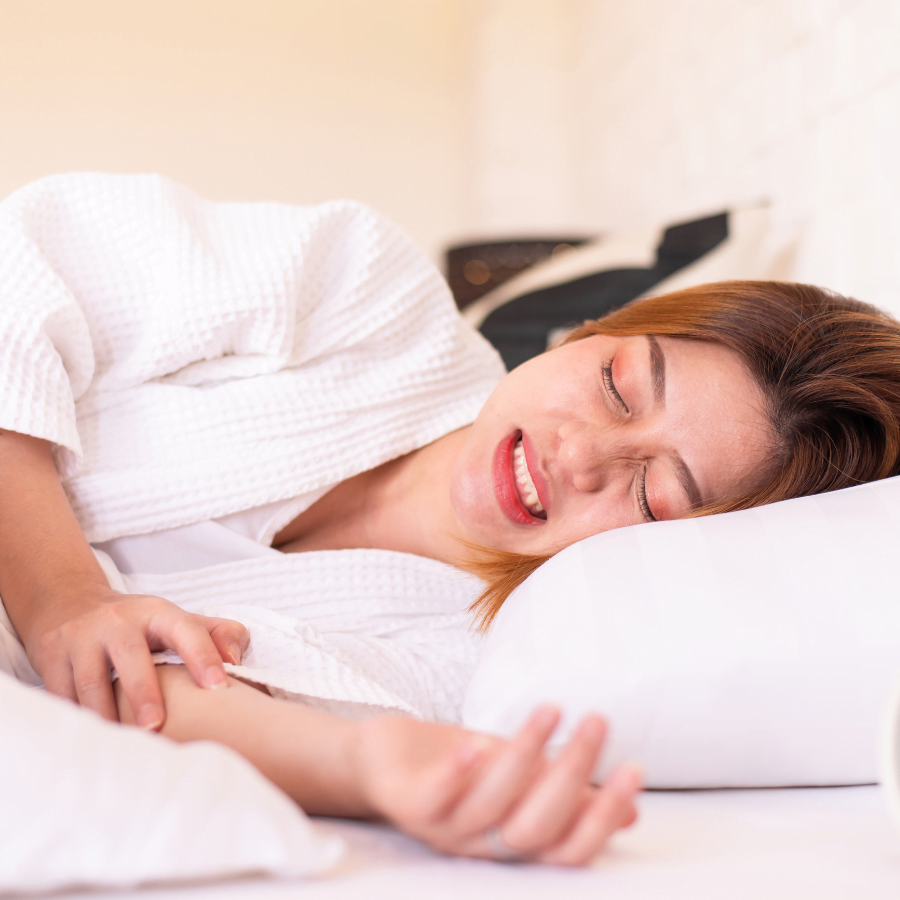Signs You Are Grinding Your Teeth
Reviewed and updated for accuracy on 12/15/23
Grinding your teeth, also known as bruxism, can occur while you sleep or even during waking hours without you realizing it. There are several signs that might indicate you’re grinding your teeth at night:
- Morning Jaw Pain or Soreness: Waking up with discomfort or tenderness around your jaw area is a common sign.
- Headaches, Earaches, or Facial Pain: Teeth grinding can lead to headaches, earaches, or pain in the jaw muscles or face, especially upon waking up.
- Teeth Sensitivity: Increased sensitivity or pain in your teeth, particularly to hot, cold, or sweet foods and drinks.
- Worn, Flattened, or Chipped Teeth: Over time, grinding can wear down the enamel, causing changes in tooth shape or visible damage.
- Audible Grinding Sounds: Some individuals might hear grinding noises during sleep, which may be noticed by their sleeping partner.
- Tongue or Cheek Biting: Frequent biting or irritation inside your cheeks or tongue could be a sign of teeth grinding.
If you suspect you might be grinding your teeth at night, it’s essential to consult a dentist. They can assess your teeth and jaw for signs of bruxism and recommend appropriate measures to prevent further damage or alleviate discomfort. Additionally, a sleep study or assessment may be suggested by a sleep specialist to monitor your nighttime habits and confirm the presence of teeth grinding during sleep.

-
Product on sale
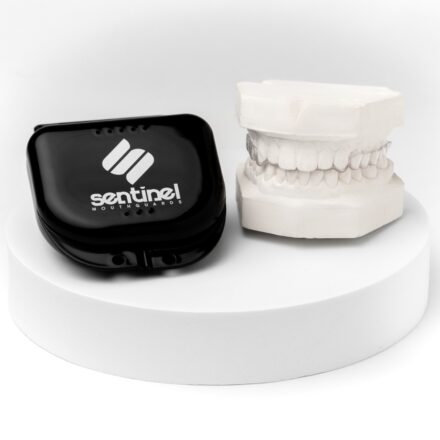 No-Show Day Mouth GuardOriginal price was: $149.00.$129.00Current price is: $129.00.
No-Show Day Mouth GuardOriginal price was: $149.00.$129.00Current price is: $129.00. -
Product on sale
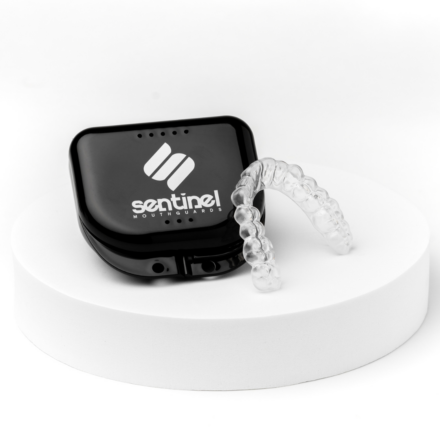 Durability Mouth Guard for Heavy Teeth GrindingOriginal price was: $215.00.$189.00Current price is: $189.00.
Durability Mouth Guard for Heavy Teeth GrindingOriginal price was: $215.00.$189.00Current price is: $189.00. -
Product on sale
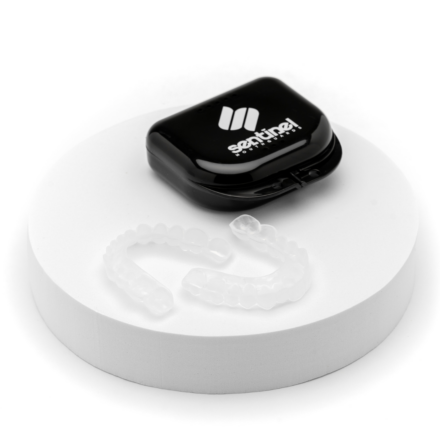 Tongue and Cheek Biting Relief Mouth GuardsOriginal price was: $189.00.$169.00Current price is: $169.00.
Tongue and Cheek Biting Relief Mouth GuardsOriginal price was: $189.00.$169.00Current price is: $169.00. -
Product on sale
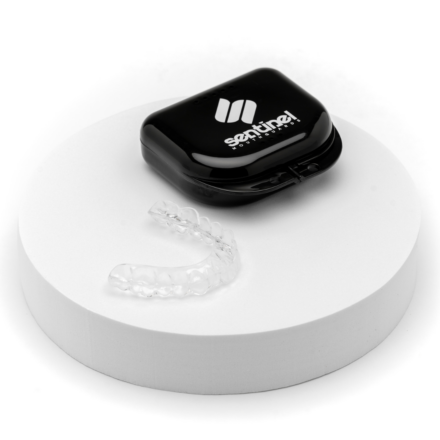 Custom Hard Night GuardOriginal price was: $169.00.$149.00Current price is: $149.00.
Custom Hard Night GuardOriginal price was: $169.00.$149.00Current price is: $149.00. -
Product on sale
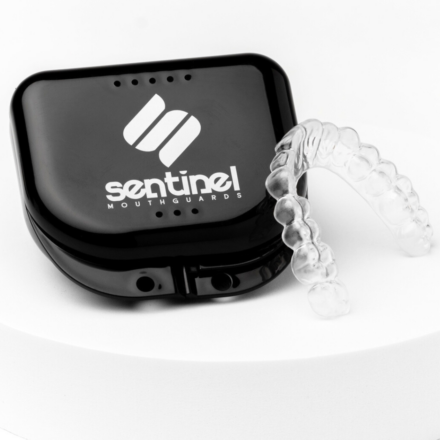 Custom Soft Night GuardOriginal price was: $149.00.$129.00Current price is: $129.00.
Custom Soft Night GuardOriginal price was: $149.00.$129.00Current price is: $129.00. -
Product on sale
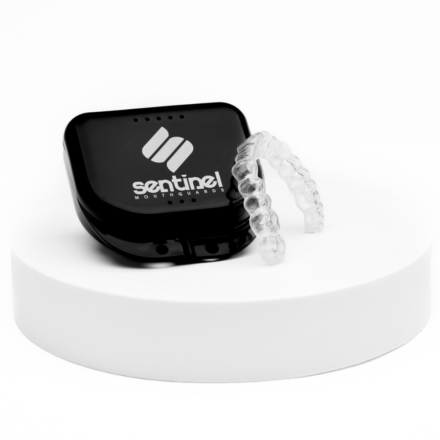 Custom Dual Laminated Night GuardOriginal price was: $169.00.$149.00Current price is: $149.00.
Custom Dual Laminated Night GuardOriginal price was: $169.00.$149.00Current price is: $149.00.
Bruxism generally results secondary to other problems. Let’s explore details about this disorder and what you can do to stop it. It’s essential to know what bruxism is, why it happens, and what to do about it.
What causes excessive teeth grinding?
Bruxism is often linked to stress and anxiety. The mounting stress causes us to hold tension in our neck, back, shoulders and jaw. Bruxism can also be caused by sleep problems such as sleep apnea, taking certain medications and drugs and bite alignment issues.
Excessive teeth grinding, or bruxism, can have various causes. Here are some common factors that may contribute to or trigger teeth grinding:
- Stress and anxiety: Emotional stress, anxiety, or tension can lead to increased muscle activity, including grinding of the teeth. Bruxism often becomes more prevalent during times of heightened stress.
- Malocclusion: Misalignment of the teeth, such as an abnormal bite or crooked teeth, can cause the jaw to move in an irregular manner. This misalignment can result in teeth grinding as the jaw tries to find a more comfortable position.
- Sleep disorders: Certain sleep disorders, such as sleep apnea, can be associated with teeth grinding. Sleep apnea involves interrupted breathing during sleep, which can cause the body to respond with grinding motions to try to open the airway.
- Medications and substances: Some medications, such as certain antidepressants or stimulants, have been associated with bruxism as a side effect. Additionally, excessive consumption of caffeine or alcohol can increase the likelihood of teeth grinding.
- Lifestyle factors: Habits like excessive alcohol consumption, smoking, or using recreational drugs have been linked to an increased risk of bruxism.
- Dental factors: Poor dental alignment, missing teeth, or previous dental work can contribute to teeth grinding by disrupting the normal biting and chewing patterns.
- Other medical conditions: Bruxism can be associated with certain medical conditions such as Parkinson’s disease, Huntington’s disease, gastroesophageal reflux disorder (GERD), and epilepsy.
Is there a way I can tell if I’m grinding my teeth? Like a self exam?
While a self-examination cannot provide a definitive diagnosis, it can help you identify potential signs or symptoms of teeth grinding (bruxism). Here are a few steps you can take to self-examine and gain more insight:
- Check for jaw pain or soreness: Pay attention to any discomfort or soreness in your jaw muscles, especially in the morning after waking up. Gently palpate the muscles in front of your ears and along your jawline to see if they feel tender or tense.
- Inspect your teeth: Look for signs of wear or damage on your teeth. Use a mirror to examine the surfaces of your teeth for flat spots, chips, fractures, or uneven edges. These can be indications of grinding.
- Assess tooth sensitivity: Take note of any increased sensitivity to hot, cold, or sweet foods and beverages. Enamel erosion due to grinding can lead to heightened tooth sensitivity.
- Observe changes in tooth position: Notice if your teeth appear to be shifting or if gaps have developed between your teeth. These changes could be a result of grinding-induced pressure on the teeth and gums.
- Ask a sleep partner: If you sleep with a partner or share a room with someone, ask them if they have ever heard you grinding your teeth during sleep. Their observations can provide additional insights.
Keep in mind that self-examination can help raise your awareness of potential teeth grinding, but it is not a substitute for a professional evaluation. If you suspect you may be grinding your teeth, it is advisable to consult with a dental professional. They can perform a comprehensive examination, evaluate your symptoms, and provide a proper diagnosis.
Did you know?
During the height of COVID-19, with so many unforeseen challenges, dentists saw a record-breaking number of cracked teeth, headaches, and sore jaws.
How can a dentist tell if I’m grinding my teeth?
A dentist can determine if you are grinding your teeth (bruxism) through a combination of methods, including:
- Clinical examination: During a dental check-up, the dentist will visually examine your teeth and look for signs of wear, chipping, or fractures. They will also evaluate the alignment of your teeth and the condition of your jaw joints.
- Palpation of the jaw muscles: The dentist may gently palpate the muscles around your jaw to check for tenderness, swelling, or abnormalities. These can be indicators of excessive muscle activity related to teeth grinding.
- Dental history and symptoms: The dentist will ask you about any symptoms you may be experiencing, such as jaw pain, headaches, or tooth sensitivity. They will also inquire about your dental history, including any previous diagnoses or treatments related to bruxism.
- Dental X-rays: In some cases, the dentist may take dental X-rays to assess the condition of your teeth, jawbone, and temporomandibular joints (TMJ). X-rays can reveal underlying dental problems that may contribute to teeth grinding or the effects of grinding, such as tooth damage or changes in the jawbone.
- Bite analysis: The dentist may evaluate your bite (occlusion) to determine if there are any abnormalities or irregularities that may be contributing to teeth grinding. This can involve examining how your upper and lower teeth come together when you close your mouth.
Based on the findings from these assessments, the dentist can diagnose whether you are grinding your teeth and determine the severity of the condition. They will then discuss appropriate treatment options and preventive measures tailored to your specific situation.
Are there any risk factors that increase the likelihood of teeth grinding?
Yes, certain risk factors can increase the likelihood of teeth grinding (bruxism). These factors may make an individual more susceptible to developing or exacerbating the condition. Here are some common risk factors associated with teeth grinding:
- Stress and anxiety: High levels of stress and anxiety can increase muscle tension, including the muscles involved in jaw movement, which can lead to bruxism.
- Age: Bruxism is more prevalent in children and tends to decrease with age. However, it can still occur in adults, especially during periods of stress or as a result of other factors.
- Sleep disorders: Sleep-related disorders, such as sleep apnea, snoring, or insomnia, have been linked to an increased likelihood of teeth grinding during sleep.
- Family history: There may be a genetic component to bruxism. If someone in your immediate family, such as a parent or sibling, has a history of teeth grinding, you may have a higher risk of developing the condition.
- Medications and substances: Certain medications, such as antidepressants or stimulants, have been associated with an increased risk of bruxism. Furthermore, the use of substances like caffeine, alcohol, or recreational drugs may also contribute to teeth grinding.
- Personality traits: Individuals with certain personality types, such as those who are highly competitive, aggressive, or perfectionistic, may have a higher risk of bruxism.
- Malocclusion and dental factors: Dental factors like misaligned teeth (malocclusion), missing teeth, or previous dental work can contribute to an increased likelihood of teeth grinding.
- Lifestyle factors: Certain lifestyle habits, such as excessive alcohol consumption, smoking, or drug use, have been linked to a higher risk of bruxism.
Can children or infants also experience teeth grinding during the night?
Yes, teeth grinding, known as bruxism, is not uncommon in children and infants. In fact, it’s estimated that about 15% to 40% of children grind their teeth at some point during their childhood. It often occurs in infants when they are teething and can persist through early childhood.
What can I do to stop it?
People are often surprised to learn they’re grinding their teeth. But once they know, they’re usually eager to know how to stop the dangerous condition. A specific solution to teeth grinding can be difficult to identify. But several medical options and treatments can help control the situation and prevent more damage to the teeth.
If you suspect stress is causing your teeth grinding disorder, consult your doctor about options to manage anxiety. But if a sleep disorder is driving bruxism, the root cause of bruxism needs to be explored. For example, 70% of patients that snore suffer from obstructive sleep apnea. A sleep test helps determine the seriousness of this problem.
Dental Night Guards are the most common way professionals treat bruxism. Night guards are devices worn at night to protect the teeth against grinding during sleep. Night guards prevent tooth damage by absorbing the impact caused by grinding. In most cases, you will continue to grind your teeth while wearing the mouth guard. The mouth guard simply protects the teeth and can reduce or eliminate headaches, jaw pain, jaw tension, tooth sensitivity, and more.
Exercising the jaw
Another way to limit bruxism is by practicing daily jaw exercises. Consult either a chiropractor or your dentist to guide you on the type of exercises to use. But start by using warm, moist heat with a washcloth on the jaw to help relax the muscles. Identify sore muscles by pushing along the area in front of your ears and your temples. Then, place the washcloth over these areas and finger massage any tender spots.
Train yourself to stop clenching or grinding your teeth
You can also control some teeth grinding habits by training yourself not to clench or grind your teeth during the day. Do this by putting the tip of your tongue in between your teeth from time-to-time. This practice trains your jaw muscles to relax and reminds you to stop clenching.
Avoid excessive alcohol intake
Studies have shown that excessive intake of alcohol tends to aggravate teeth grinding. For this reason, bruxers should avoid excessive alcohol intake.
Keep your teeth away from ice cubes, pens, pencils etc
Bruxism patients shouldn’t chew on pencils, pens, gum, or non-food items. Remember what mom said: Your teeth are not tools!
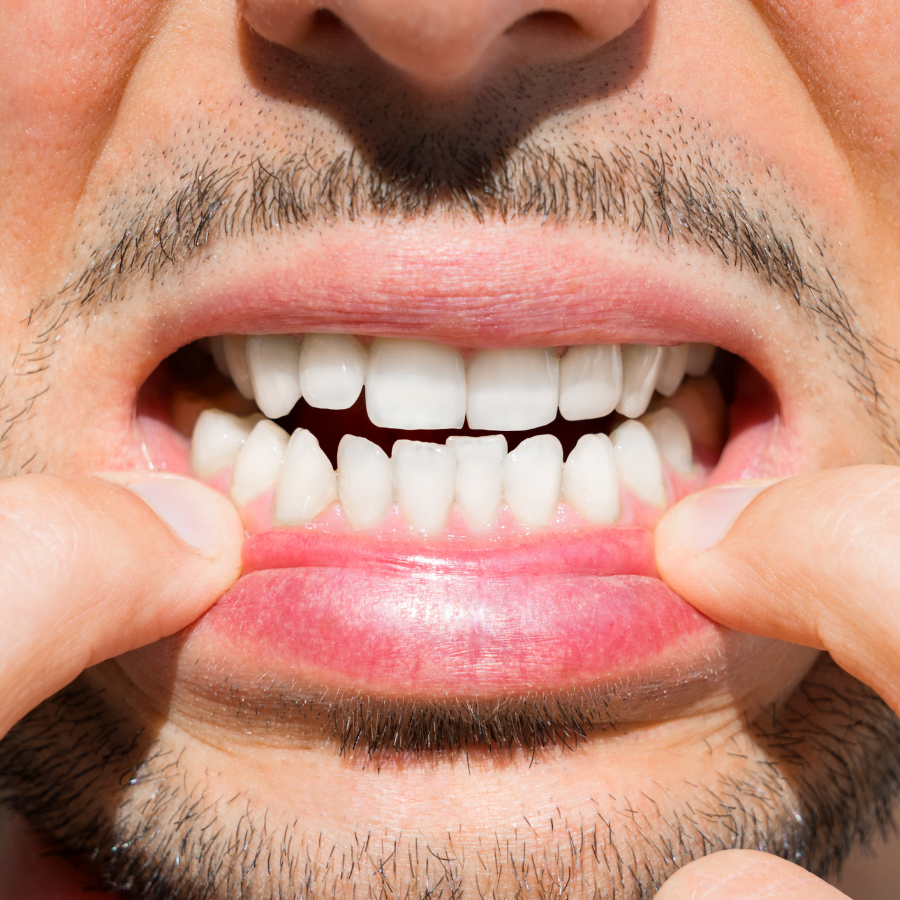
Protecting Your Teeth
Bruxism is a common problem that affects people of all ages. The most common cause of teeth grinding in adults is stress, but sufferers should explore other possibilities. Some people grind due to prescription medications, diet, lack of exercise, or caffeine or alcohol overconsumption. Others, including children, suffer from bruxism for no apparent cause or reason. Research suggests sleep disorders may aggravate bruxism, so you may want to discuss this with your physician.
Although mild bruxism presents minimal risk for most people, chronic bruxism may cause other health problems such as hearing loss, tension headaches, and dental issues. Since bruxism is usually a symptom of an underlying health problem, there’s no specific medication to cure bruxism. Most dentists recommend night guards to protect the teeth and jaw from damage. For anyone who’s suffering from the disorder, a custom night guard serves a vital role.
When buying night guards, choose the type your dentist recommends
A dentist can determine the degree of damage and recommend which night guard type is best for you. Most dentists charge a fee on top of the night guard price, so expect that your consultation fee and the appliance will be an investment.
However, most night guards from dentists are made-to-order with a perfect fit. To save money on made-to-order night guards, you can simply buy direct from the lab. Often, your dentist sends the mold of your teeth to a lab for construction.
Buying straight from the lab will cost you less, and you don’t need to leave your home! Search for the best manufacturers on-line and compare prices. Once you’ve found one, you can simply place your order online, and the lab will send you a molding kit and simple instructions. You then send this back to the lab, and they craft a custom-fit night guard in less than two weeks. This option will save you a lot of money and time in dental visits!
I’m grinding my teeth and need a night guard now!
One-size fits all mouth guards
If you’re in a hurry and need a short term solution as soon as possible, the next available option is a ready-made night guard. Ready-made night guards are available in different styles and brands. Many of these standard appliances look like the mouth guards that athletes use for contact sports such as martial arts and boxing. That design may not offer an option that’s comfortable for sound sleep.
While most custom-made night guards from dentists will cost you between $350 – $950, ready-made night guards purchased over-the-counter or on the internet will cost you around $15 to $40 each. Custom-made night guards purchased directly from labs will cost between $100 – $220 per piece. Mouth guard kits from online vendors that ship directly from labs for you will help you save hundreds of dollars on your dental night guard. This choice makes sense if you prefer a custom-made night guard over the boil-and-bite variety for ultimate fit and comfort.
If you’re looking to save money and you don’t worry much about not having a custom-fit night guard for your teeth, a ready-made night guard might be a viable option for you. Popular brands are: DenTek Comfort Fit Dental Guard Kit (around $26 per piece), SmartGuard Elite ($23 per piece) and Doctor’s Night Guard ($15 per piece).
Solution to teeth grinding
When choosing the best night guard, always make sure that you make comfort and durability your top priority. You don’t always need to spend a lot in order to protect your teeth and gums from the damage caused by bruxism.
You can either buy direct or through different shopping sites. A simple Google search will lead you to hundreds of on-line stores where you can get night guards for a fraction of the price your dentist provides.
Would you like to learn more about Sentinel Mouthguards products and services? Visit our help center today!

